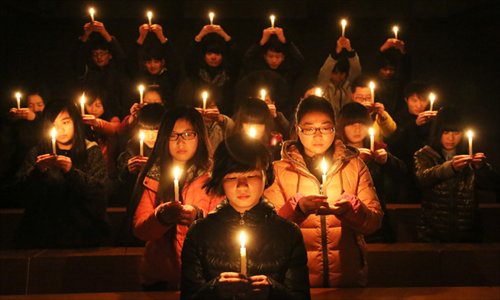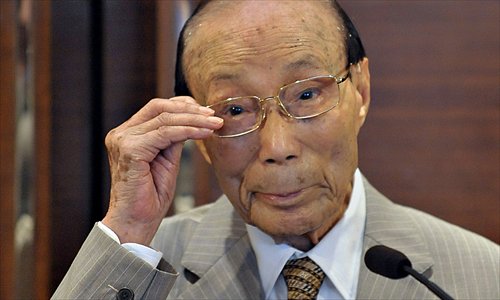Run Run Shaw remembered for charity

Students at the University of South China in Hengyang, Hunan Province mourn Run Run Shaw (inset) in a building donated by the media tycoon and philanthropist. Photo: CFP
Tributes have poured in from all over the world for the late Hong Kong media tycoon Sir Run Run Shaw, who passed away early Tuesday morning.
Although many have applauded his movie and TV empire in Asia, he is remembered especially in the Chinese mainland for his generous philanthropic endeavors that dwarfed those of many other tycoons.
Hong Kong-based Television Broadcasts Limited (TVB), which was launched by Shaw in 1967, Tuesday announced the passing of the mogul.
Shaw died peacefully at home surrounded by his family at 6:55 am Tuesday, aged 107, said TVB.
His passing immediately made headlines on major news portals in the mainland, Hong Kong, Taiwan and Southeast Asia, where movies and TV programs produced by Shaw's media empire have influenced generations of Chinese people.
Movie mega-stars such as Chow Yun-fat, Tony Leung, Andy Lau and Stephen Chow were all given their start by Shaw's media empire.
While some on the mainland may not have known the man behind their favorite films and shows, many learnt about Shaw from the buildings in their schools or universities that are named after him.
In 1973, Shaw established a foundation to promote the development of education, healthcare and arts. Since 1985, the foundation has poured billions of yuan into constructing school buildings and hospitals in nearly every provincial region in the mainland.
As of last September, this included over 6,000 school buildings from primary schools through to universities, according to xinhuanet.com.

Run Run Shaw. Photo: CFP
In 1977, Shaw received a knighthood for his charitable activities.
In commemoration of the billionaire, Net users Tuesday answered a call to post photos of Run Run Shaw Buildings at their schools on Sina Weibo.
"I hope there will be another Run Run Shaw to shoulder these social responsibilities," a Net user wrote on Sina Weibo, adding that many people had become useful members of society thanks to his generous donation to education.
"People say the Chinese hate rich people, but why do so many Chinese mourn Run Run Shaw?" wrote another Net user. "It's because his name is on school buildings everywhere, compared to so many Chinese moguls who splurge on yachts, limousines and weddings."
Chen Xuqing, a professor with the School of Management at Minzu University of China, has studied charitable activities by the nation's super wealthy.
"Shaw started his philanthropic endeavors very early, when the rich in the mainland were still accumulating their wealth," Chen told the Global Times.
However, while the number of millionaires in the mainland has risen in recent years, their charitable donations cannot compete with those in Western countries, a study by Chen showed. According to the study, the ratio of donations to GDP in China was only 0.01 percent in 2009, while the ratio stood at 2.2 percent in the US.
The Hurun Report showed last year that there were 8,100 billionaires in the mainland, 600 more than a year earlier. However, the average donation made by the mainland's top 100 philanthropists was 55.97 million yuan ($9.22 million) each, a 45 percent decrease from 2012.
"Against the backdrop of the widening wealth gap and frustrations toward the disparity from the underprivileged, the elites should take on more social responsibility," Deng Guosheng, director of the Center for Innovation and Social Responsibility at Tsinghua University, told the Global Times, adding that the country should also alter its systems to encourage charity.
Born Shao Renleng in Ningbo, East China's Zhejiang Province in November 1907, Shaw was the sixth of eight siblings. TVB has put his age at 107, not 106, due to the Chinese system of calculating ages.
He started out helping his elder brothers set up a film studio in Shanghai in 1925. The brothers later moved into Hong Kong - making and distributing films to a chain of around 100 cinemas across other Asian markets such as Singapore and Malaysia.
Shaw eventually split from his brothers to set up his own studio in the 1950s, which ushered in a golden era of Hong Kong movie making.
The Shaw studio produced about 1,000 titles, including melodramas, historical epics and kung fu classics, which influenced Hollywood big names like Quentin Tarantino.
TVB said Shaw's funeral will only be attended by his family members.
Reuters contributed to this story